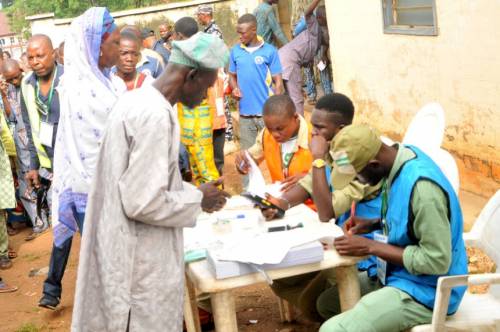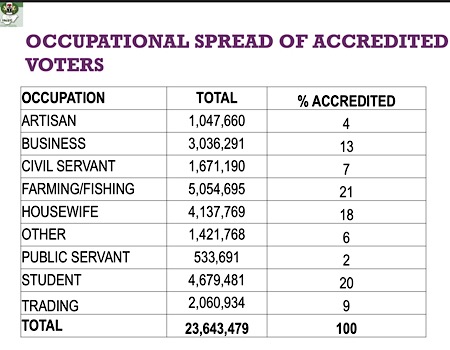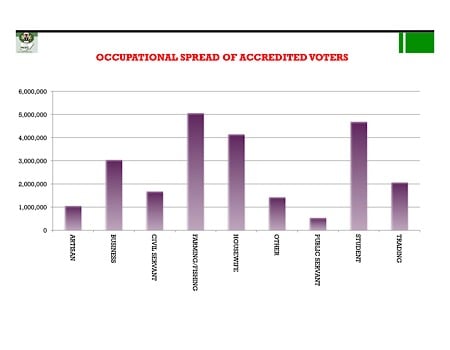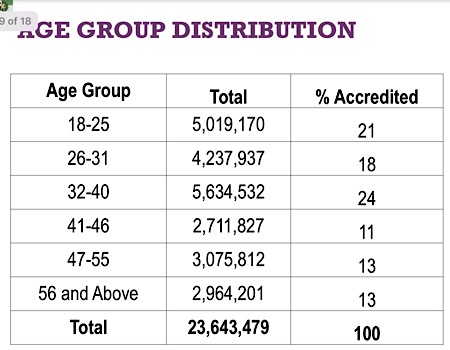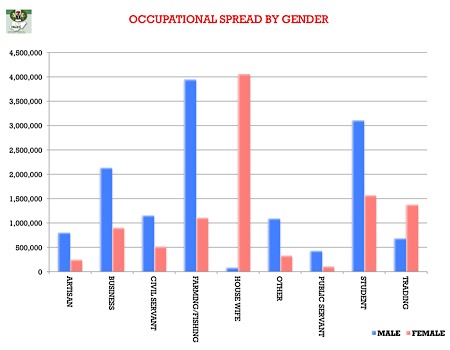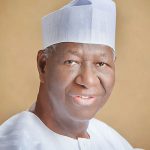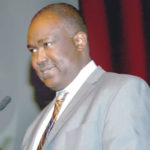
With just four months to another decisive general election, Nigerians are caught up in the web of what await them at the poll as security, the collection of voters’ card and how much credible the poll can be are perennial questions poised to the Independent National Electoral Commission (INEC). This article looks into the brick walls facing a successful election period and how the electoral body can help trust the system again.
“No, I don’t have a PVC because votes do not count. Even if I had it, I won’t vote because votes don’t count. What would influence my choice of candidate in an election is the individual pedigree of the contestants.
“What affects my involvement in an election is the transparency of the process, the boss of the electoral commission. Due to the condition of the country, I’d sell my votes for good money, let’s say for N100,000 and above because if they win or not, I won’t benefit directly.” This was the submission of Adebisi Temilola, a female in Ekiti when asked about voting in the coming 2019 elections.
Election, unarguably, is the constitutionalised way of selecting political leaders in the world over, but so many factors have clogged what is supposed to be a transparent process of election in developing countries.
Participation in the election process is somewhat tilting towards extinction owing to the imbalance and different colourations that characterise the eventual selection process.
ALSO READ: Group charges INEC on credible poll
In Nigeria, there have been overwhelming reasons why voting during an election is becoming unpopular. Chief of which is beclouded by the cumbersome and drabby nature of registration and collection of the Permanent Voters Card (PVC).
According to Wikipedia, elective democracy had been introduced in Nigeria in May 1919, when the Townships Ordinance gave the right to vote for three members of Lagos Town Council to some men. The first elections to the council were held on 29 March 1920.
Since the first post-independence election in 1964 and 1965, it has been from one controversy to the other owing to factors making the election outcomes questionable.
Fast forward to what is tagged the most credible and free and fair election till date, the 1993 election between the late Moshood Abiola of the Social Democratic Party (SDP) and Bashir Tofa of the National Republican Convention (NRC), was annulled by the Ibrahim Babaganda military government and that, to a large extent, breached the trust of Nigerians in the electioneering process.
In fact, after the rebirth of democracy in 1999, tales of rigging, violence, ballot snatching had overwhelmed the election process so much so that former President late Umar Musa Yar’ adua admitted that the 2007 election that brought him to power was not credible.
In the last presidential and National Assembly elections in 2015, the total numbers of accredited voters were placed at 23, 643, 479.
Out of the lot, voters between ages 18 and 25, were about 5, 019, 170, which is about 21 per cent of the entire accredited voters. Voters between 26 and 31 were 4, 237, 937, which is 18 per cent of the total voters. Voters between ages 32 and 40 are about 5, 634, 532, amounting to 24 per cent.
Also, voters between 41 and 46 years of age were 2, 711, 827, resulting in 11 per cent of accredited voters. Voters between 47 and 55 were about 3, 075, 812, which was 13 per cent of the voters. And voters above 56 years, 2, 964, 201, which were about 13 per cent.
People practising farming/fishing had the highest numbers of accredited voters with 5, 054, 695, which is 21 per cent of total voters and this was followed closely by students and housewives with 4, 679, 481 and 4, 137, 769, representing 20 and 18 per cents respectively.
It is also interesting to note that men registered to participate in the 2015 election than women with a ratio of 13, 434, 042 to 10, 209, 455.
There has been a new twist to voting in Nigeria, which is characterised by the premium placed on the voters card more than the effect of the vote cast.
The premium, which is mostly monetary, has informed voters that that is the closest way to get something back from a government that arbitrary let them down every four years, sadly, the emerging option for some section of voters is to sell their votes.
Vote buying and selling as the case may be is turning to the new misnomer and a new order in the Nigerian voting system.
It didn’t end there. The vote buying trade took a new dimension at Osun gubernatorial election as politicians wooed voters with cash of N10,000 on Whatsapp and other secret platforms.
Apart from vote buying, the irregularities in the election process, from PVC registration to collection, straight up to the voting proper have made a large number of voters lose credence for the electorate body and hence, boycott the registration, collection and voting exercises.
While speaking with selected Nigerians on their views on the electioneering process, their responses mirror why the Independent National Electoral Commission (INEC) must tie loose ends in order to have an indeed, credible, free and fair election come 2019.
Odeyemi Ifeoluwa, male in Osun State said: “Yes, I have PVC, but it’s basically because of identification purpose. I’m not sure I would vote, but if I would, it would be because I have a strong conviction that the votes will count and my choice of candidate would be influenced by the need to change the people in power.
The Osun gubernatorial election I took part in changed my mind about an election; standing in the hot sun for about seven to eight hours before I could cast my vote and in the end, it still didn’t matter because of massive manipulation,” Ifeoluwa said.
Also, another respondent in Ibadan, Akinrujomu Ayokunnumi, female explained that she doesn’t have a PVC, but wouldn’t have voted if she did.
“I wouldn’t have voted if I had because votes don’t count 98 per cent of the time in this country.
“What would influence my choice of candidate in an election is integrity and a real, sustainable manifesto.
“What affects my involvement in an election is free and fair election process, sadly, we don’t have that.”
Fadeyi Bukunmi, female in Ibadan explained that even if she had her PVC, she wasn’t going to vote because “there’s nobody to vote for. What influences my choice of candidate is honesty, which is so rare, track record, level of intelligence, physical fitness, a heart for the people not for amassing wealth.”
Surprisingly, the majority of respondents said nothing could make them sell their votes, affirming that they will rather not vote than sell their rights.
Olaobaju Tejumoluwa a female at Ilorin enthused that her safety is paramount during an election. “Yes, I have my PVC, and I’ll get to vote finally and it also serves as a means of identification.”
She added that “What influences my choice of candidate in an election is age factor and also the person’s past involvement in politics; if the person has ever been in a political position before, what exactly did he or she do with it? Also, religion is important to me, so it will definitely influence my choice of candidate.
“Another thing is my safety. My safety is key; if it’s not safe I’m not voting. If my vote won’t count, I’m not voting and no, I would never sell my votes.”
Adesina Ifeoluwa, a male resident in Lagos said: “Yes, I have my PVC, because to an extent, I believe I have the right to choose who or not becomes my leader.
“What influences my choice of career is their credibility and the proposed manifesto. What would influence my choice in an election is my location and youth service.
“I would not sell my votes because it may in the long run prove to be my only short at the Nigeria of my dream.”
Umoru Grace, a business woman in Akwa Ibom, explained that “I don’t have my PVC because I was in a confined environment, so, I couldn’t access the registration area. I don’t think I would have voted if I had my PVC because of the stress and security. No, I would never sell my votes.”
Ogunmefun Rachael, a resident of Kano said: ”I have my TVC, I haven’t gotten the permanent card, but if I had my PVC, the chances I’d vote is 50:50. What influences my choice of candidate is the ability of the candidate to perform is actually the only influence anyone needs to choose a candidate. I would never sell my vote.
Moving forward, the opinion of the people as to whether the poll is still the best way to elect the best public office holders in the most civil way is hanging on a thread.
The electoral body, INEC, still has some ground to cover to assure Nigerians that the poll is not just a charade.
INEC needs to come up with ways to ensure the smooth running of PVC registration as a majority of respondents bemoaned the cumbersome registration process.
Just like the registration stress, the collection of the voters’ card is even twice as hard and another uphill task.
As at August 15, 2018, the total number of registered voters was pegged at 86, 627, 104 out of which a mammoth 10 million were yet to collect as at October, 2018, after the INEC deadline for pick up.
INEC needs to come out with a concrete plan to ensure that more Nigerians collect their voters’ card before the deadline as the number of uncollected PVCs could affect the eventual election result.
Registration and collection of PVC must be as easy as it can be to attract the majority of eligible voters to exercise their franchise.
More so, because Nigerians pride in knowing the intellectual strength of their leaders, a well-coordinated debate for all political aspirants across the state, organised by the electoral body would send a serious message to contestants and attract national and international interests from voters.
INEC should also consider partnering with Nigeria Postal Service (NIPOST) in distributing the permanent voters’ card across the 36 states of Nigeria and the Federal Capital Territory (FCT).

